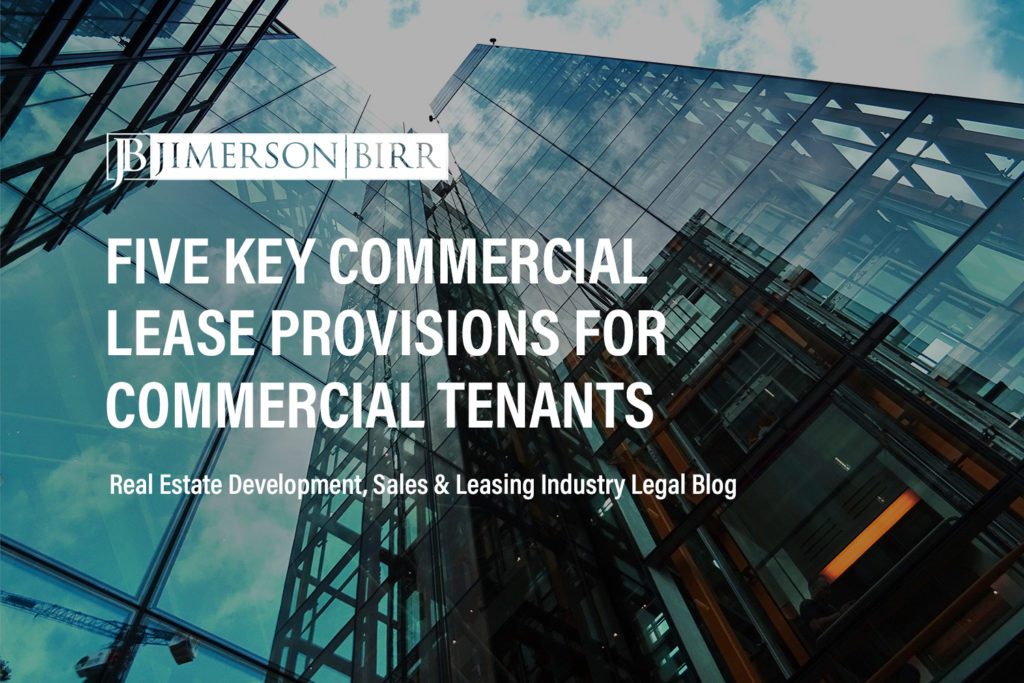A business owner may enter into a commercial lease for purposes of renting space to operate its business activities. Unlike residential leases, a commercial lease should not be a one-size-fits-all lease. Under Florida law, non-residential tenancies (commercial tenancies) are governed by Sections 83.001-82.251 of the Florida Statutes. Business owners, or tenants, may be able to negotiate many of the provisions of their commercial lease with the landlord, and make it more customizable to fit their business objectives. While some of the commercial lease provisions contain typical, boilerplate language, there are some provisions that commercial tenants should carefully review and negotiate in their favor.
1. Rent
One of the most important provisions in a commercial lease is, of course, the tenant’s obligation to pay rent. The base rent for commercial space is usually calculated by the square footage of the space. In addition to base rent, commercial tenants may be required to pay the landlord some additional rent for varying items, including operating expenses and real estate taxes. This type of commercial lease is referred to as a “net lease.” Depending on the lease term, rent may also escalate over the term of the lease.
Commercial tenants may be wary of how their additional rent obligations may impact their rent payment over time. To avoid an unexpected increase in rent payment, commercial tenants can negotiate an all-inclusive lease, or “gross lease.” A gross lease provides that the tenant will pay a fixed, flat fee for the use of the space, and the landlord will be responsible for paying any and all expenses of the property, including operating expenses and real estate taxes. A gross lease may have a slightly higher rent payment than a net lease, however, the commercial tenant will not bear the risk of sudden and unexpected rent increases. On the other hand, if a net lease is selected, the tenant should negotiate a cap on the amount of additional rent.
2. Permitted Use
The permitted use provision controls how a commercial tenant can utilize the leased space. Commercial tenants should negotiate the permitted use provision to be as broad as possible, in order to account for changes to their business. For example, a permitted use provision that states the tenant can use the leased space “for any lawful purpose” is ideal. However, some commercial landlords may try to limit the tenants use of the leased space, and include a list of prohibited uses. If this is the case, commercial tenants must carefully review the list of prohibited uses and ensure that this provision does not interfere with its current or future business operations.
3. Exclusive Use
Depending on the type of commercial space, an exclusive use provision may be extremely beneficial to the success of a commercial tenant’s business. An exclusive use provision restricts or limits the landlord from leasing other space to a tenant with the same or similar business. For example, if the tenant operates a restaurant in part of a multi-space commercial building, it would be beneficial for the tenant to negotiate an exclusive use provision in their lease, that limits or eliminmates the number or types of competing restaurants on the landlord’s property.
4. Repairs and Maintenance
In general, commercial landlords do not have a duty to make repairs or maintain leased space. See City of St. Petersburg v. Competition Sails, Inc., 449 So. 2d 852, 854 (Fla. 2d DCA 1984) (“[I]n the absence of a special agreement to repair, a landlord is not under such a duty.”). As such, it is important for tenants to negotiate with the landlord, and define their respective repair and maintenance obligations in the commercial lease. It is also imperative that, prior to signing the lease, the tenant properly inspect the premises to determine its condition.
If the landlord is under an obligation to make a repair, pursuant to the commercial lease, and fails or refuses to do so, the tenant is protected by Section 83.201 of the Florida Statutes. Specifically, Section 83.201 provides that, if a repair is required, the tenant must provide the landlord with written notice, giving the landlord at least 20 days to make the repair, and the tenant may withhold rent until repairs are complete. Further, if the landlord does not complete the repair in the allotted time, the tenant may abandon the premises, retain the amount of rent withheld, terminate the lease, and avoid any liability for future rent or charges under the lease.
5. Casualty
Commercial leases usually contain a casualty provision that outlines the landlord’s and tenant’s obligations, in the event the leased space is damaged by a flood, fire, hurricane, or other natural disasters.
These casualty provisions are especially important to commercial tenants in Florida, who lease commercial space in or near a flood zone. To minimize risk due to a casualty, commercial tenants should ensure that the casualty provision contains the following rights and obligations:
- Right to repairs: In the event the leased space is damaged by a casualty, the commercial lease should provide that the landlord is immediately required to make repairs and restore the leased space within a specified period of time.
- Right to terminate lease: The commercial lease should provide that the tenant has the right to terminate the lease early, with notice, upon the occurrence of a casualty.
- Right to abatement of rent: To the extent the leased space cannot be fully occupied due to the damage from a casualty, the commercial lease should provide for an abatement of rent, until the leased space is fully repaired and restored.
Conclusion
Signing a commercial lease in an important step in operating a successful business. Before signing that lease, business owners should carefully review and negotiate the lease to minimize risk and to comport with their business objectives.
Authors:

